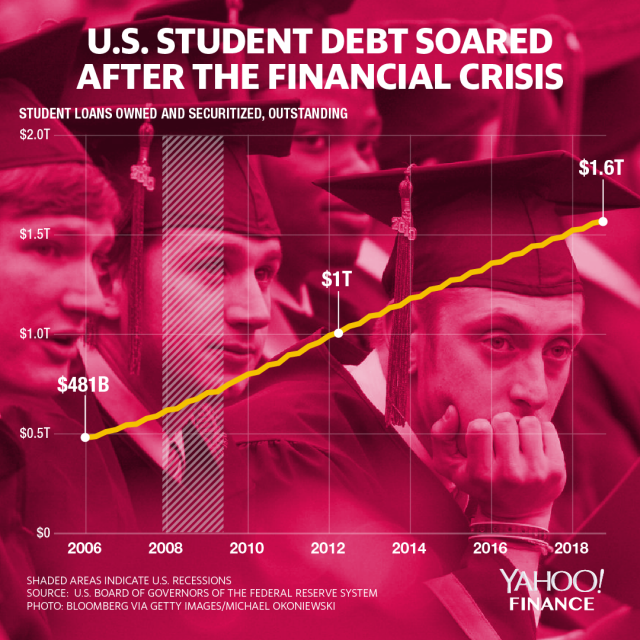Biden defends vote on 2005 law that made it harder to escape student debt

Presidential candidate Joe Biden may have endorsed former opponent Elizabeth Warren’s plan to reform the consumer bankruptcy system to make it easier to discharge student debt, but his voting history on the issue continues to haunt him.
In 2005, then-Senator Biden voted for a bill called the Bankruptcy Abuse Prevention and Consumer Protection Act. The bill was meant to address abuse of the bankruptcy process. It made it more difficult to declare bankruptcy, and much, much harder to have student debt discharged. Under the 2005 law, educational loans can only be discharged if not doing so would impose an “undue hardship.”
“The bankruptcy bill was passing overwhelmingly, and I improved it,” the former U.S. vice president stated during the Democratic presidential debate in Washington, D.C. on Sunday. “I had a choice, it was going to pass — Republican president, Republican Congress, and I offered two amendments to make sure that people under $50,000 would not be affected and women and children would go to the front of the line on alimony and support payments… I did not like the rest of the bill, but I improved it, number one.”

But his opponent Bernie Sanders (I-VT) asserted that because of that 2005 bill, 45 million Americans are struggling with more than $1.6 trillion in student debt.
“That bankruptcy bill made it impossible or very difficult for people to escape from that student debt,” Sanders stated. “It was a very, very bad bill.”
Here's Republican Sen. Orrin Hatch introducing the bankruptcy bill for a Senate floor vote in 2005, thanking Biden for years of tireless support for helping write and advance the legislation. pic.twitter.com/NKKiVJNwYK
— Lee Fang (@lhfang) March 16, 2020
Bill ended up ‘demonizing a lot of people’
Warren also profoundly opposed the 2005 bankruptcy bill.
“These are hard-working people who have been laid low by forces far beyond their control,” Warren, then a Harvard Law School professor who had done extensive research into bankruptcy filings, argued in an op-ed in 2005 for The New York Times. “They are the constituents of the politicians who took the credit industry's side over theirs.”
Borrowers were clearly secondary to the banks’ and lenders’ interests when the legislation was passed, another expert argued.
"There is an argument that public money lent at below-market rates shouldn't be dischargeable in bankruptcy. But there is no justification for making high-interest consumer debt non-dischargeable in bankruptcy,” Austin Smith, an attorney who specializes in student debt and bankruptcy, told Yahoo Finance. “Those two things can never be made equivalent. But that's what Congress did in 2005. And they did it by demonizing a lot of people who were having a hard time, and they did it by telling us that the banks were the victims and the banks needed the same protection we gave to the charities and nonprofits who administered the Higher Education Act.”
But he was willing to give Biden the benefit of the doubt, adding: “I've listened to Senator Biden talk about how the bill was going to pass anyway and you can't die on every hill and a lot of that is true. But it's only true if you go back and make it right when you're able. And I do hope that's what he meant about taking that vote."
But Sanders wasn’t ready to accept Biden’s U-turn just yet.
On stage, Sanders stressed the significance of that vote: “Well, if you hadn't voted for it, and if you had rallied other people, as I tried to do in the House voting against it, we might not have the problems with it we have today.”
‘Quasi-standard of mythic proportions’
In the meantime, over the years — in part due to the 2005 bill, as well as other factors — many people have believed that under existing laws, when one files for bankruptcy, student debt can’t be discharged. But a series of new cases are threatening to upend that belief.
In one specific case from January, where a navy vet had $220,000 in student loans, a New York judge stressed that the prevailing interpretation of bankruptcy laws has produced a “quasi-standard of mythic proportions”, which is that it’s impossible to discharge student loans. She then ordered that his student debt be discharged.
The lender is currently appealing that case.
—
Aarthi is a writer for Yahoo Finance. She can be reached at aarthi@yahoofinance.com. Follow her on Twitter @aarthiswami.
Read more:
New startup aims to help student loan borrowers declare bankruptcy
'Bilking taxpayers': Warren demands $22 million owed by student loan servicer Navient
Student loan servicer appeals landmark $220,000 bankruptcy ruling
Read the latest financial and business news from Yahoo Finance
Follow Yahoo Finance on Twitter, Facebook, Instagram, Flipboard, SmartNews, LinkedIn, YouTube, and reddit.
